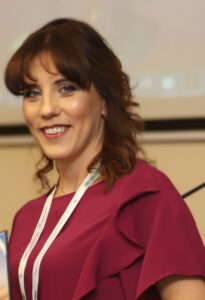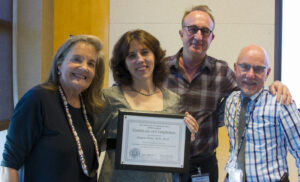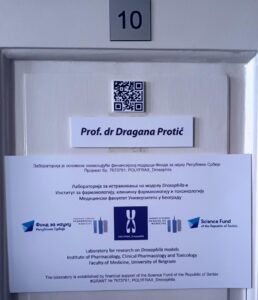-
1. Your Name: Dr Dragana Protic, MD, PhD
2. Number of lab members or colleagues: 5
3. Location: Institute of Pharmacology, Clinical Pharmacology, and Toxicology, School of Medicine University of Belgrade, Belgrade, Serbia
4. Graduation Date: 2004
5. Indicators of success
a. H index: 12
b. Grants that you have received: 3 as a PI, and a few as co-investigator
c. Success of your lab’s members: We are a young research group, and include Ph.D. students, research assistants, and scientists at the early stages of their careers. However, they are very successful with their first presentations at international conferences, posters, abstracts, and articles. On the other hand, there are many, very successful, collaborative groups of researchers in the field of fragile X and/or research on Drosophila.

Hello! Who are you and what are you working on?
Hi, I am Dr. Dragana Protic, MD, Ph.D., a medical doctor, and scientist. I am an associate professor at the Department of Pharmacology, Clinical Pharmacology and Toxicology, School of the Medicine University of Belgrade, Belgrade, Serbia. As a clinical pharmacologist, I have a previous background and considerable enthusiasm to advance my knowledge, skills, and experience in drug development. I am a pioneer in the research related to Fragile X-associated disorders in
Serbia and South-Eastern Europe. Specifically, I am the PI of a few research grants that are related to fragile X. This research is supported by the Science Fund of the Republic of Serbia, Program IDEA #GRANT № 7673781. Most importantly, I am the PI of the preclinical research on the effects of polyphenols on the Drosophila fragile X model. You can find more information about this research entitled as POLYFRAX_Drosophila at: polyfrax.com.
What’s your backstory and how did you come up with the idea?
I completed my Ph.D. studies in Molecular Medicine and residency in Clinical Pharmacology at the School of Medicine, University of Belgrade (Serbia) in 2013. My research portfolio is mainly focused on translational investigation, from bench to bedside. Accordingly, I have gained valuable knowledge, skills, and attitudes in research, education, and medical practice. In 2017, 2018, and 2021, I spent valuable time as a visiting scientist at the Kennedy Krieger Institute within the Johns Hopkins School of Medicine in Baltimore (MD, US) under the supervision of assistant professor Dr. Dejan Budimirovic, MD who has been the main investigator and sub-investigator of Clinical Trial Unit and medical co-director of Fragile X Clinic at the Kennedy Krieger Institute. These educational visits enhanced my knowledge and skills in the area of Fragile X. Thanks to Dr. Budimirovic, who is visiting professor at Belgrade’s School of Medicine since 2016, my institution established stronger collaborations with US institutions in the field of fragile X.
In addition, I was a scholar at the University of California at Davis, MIND Institute, for the International Training Program in Neurodevelopmental Disorders (ITPND), where I stayed for 6 months in 2018 under the supervision of Prof. Dr. Randi Hagerman. The ITPND provides an opportunity for researchers, clinicians, and educators from around the world to learn from the faculty and staff of the world-renowned MIND Institute and to establish enduring collaborations that benefit families affected by neurodevelopmental disabilities around the globe. My mentor, Prof. Dr. Hagerman is among the most successful and famous medical doctors and researchers in the field of fragile X. During my stay at the MIND Institute, I participated in targeted treatment trials, wrote a review on the pharmacological therapy available for the targeted treatment of fragile X syndrome (FXS), and fragile X-associated neuropsychiatric disorders (FXAND). I
carried out research on the association between IQ and FMR1 protein (FMRP) levels across the spectrum of CGG repeat expansions in the FMR1 gene. I also co-authored other publications and book chapters during my stay at the MIND Institute.
Thanks to all efforts, the first Fragile X Clinic in South-Eastern Europe was established in Belgrade in 2018. We also established Fragile X Society-Balkans and organized children with FXS and their parents from a
large region involving multiple countries. Finally, I was the main organizer of the international conference on Autism and Fragile X-associated disorders which was held in Belgrade in 2019. The conference brought world-renowned experts in the field to Serbia to share knowledge with professionals from Serbia and other European countries and to meet with patients with FXS and their families.
Finally, thanks to all the listed activities I decided to establish a laboratory within my School of Medicine in Belgrade, at the Institute of Pharmacology. Simply, I decided to bring all the acquired knowledge back to my country and my institution and start examining the effects of different substances/medications/food compounds on the Drosophila fragile X model.

Dr. Protic at the MIND Institute, University of California, Davis
How do you describe the process of creating and learning on the project?
Project’s website: polyfrax.com was created. Through this website, we present our preclinical research and all project information. In addition, we launch the project through conference presentations, lectures and local media covered our activities in the fragile X field many times. The most interesting, there is a short movie, produced by UC Davis, “Healing and Hope: Treating Fragile X in Serbia” about fragile X activities in Serbia, and an international conference that was organized in Belgrade in 2019.

Dr. Protic’s presentation of her work
Since launch, what has worked to make your project grow/successful?
Having a good team is the key to success! Fortunately, I am surrounded by young, enthusiastic people, my Ph.D. students, and collaborators and they treat every situation as a learning opportunity. On the other hand, I am lucky because I have the best supervisors and mentors worldwide! Thanks to the support of my mentors, Dr. Dejan Budimirovic and Dr. Randi Hagerman, as well as other colleagues from the US, we have established a new field of research in my country: The field of Fragile X. I am so proud and thankful! I am emphasizing the motto of the National Fragile X Foundation: “Together, we are stronger!”
How is everything going nowadays, and what are your plans for the future?
My laboratory is established in 2022. We have just started with our experiments on Drosophila fragile X models. However, we are planning to extend our research on fragile X models of flies and to collaborate with foreign partners. We are very open to any kind of collaboration. In addition, the future plan is to build a fragile X Registry, Database, and Repository in Serbia for which external international funds will be critical.
What is your morning routine?
My morning inspiration is my children, Jovana (18) and Mihailo (13) – two “early birds” who commence with their preparation for school at dawn break. I enjoy my morning chats with them over breakfast followed by a coffee and we normally go through the plan of the day with each other before we all leave our home. As my family represents by far the most important driver in my life, I tend to adjust my professional duties and obligations whenever possible to my activities with my children and I never get tired of that.
My morning wake-up is complete only once I give a morning walk to our pet – an 8-year-old dog named Bertha, who enjoys her morning routine with me and in turn helps me focus on what’s coming in my agenda of the day. I realized that more often than not our morning walks help me recall a number of things to be done that I would otherwise forget, so I treat Bertha as my “home assistant”!
What does a typical day look like at work for you?
In between the lectures and other activities with my students I enjoy spending time in my lab and running my research. I consider the lab as my own “queendom”, which is much more than spending time behind a computer and preparing presentations. My colleagues and I appreciate a lot our informal meetings where I collect a lot of useful information on what goes on within and beyond our institute.
As the scope of my work has recently expanded onto assignments supported by the Science Fund of the Republic of Serbia, my daily routine ever more often includes the interaction with the Fund, where the paperwork sometimes seems more demanding than necessary, but it helps me improve in writing proposals and designing the project concept notes. Finally, I spend time with patients with fragile X syndrome and their families, encouraging and supporting them.
What does your workstation look like?
My office and laboratory are located at the Institute of Pharmacology, Clinical Pharmacology, and Toxicology at the School of Medicine in Belgrade. My workshop contains one desk with a computer, printer, analog telephone, and a comfortable computer chair. I use an HP computer and screen. In my office, there is also very comfortable furniture, which includes three sofas and one small table, which are used for project preparations, journal clubs, consultations, and student exams. My office is directly connected to the laboratory where my associates, Ph.D. students, and I performed experiments. In the highest standard laboratory for behavior experiments on Drosophila melanogaster, there is equipment for Drosophila anesthesia with carbon dioxide, a microscope, T-maze for olfactory learning and memory, a system for circadian rhythm tracking, a 3D printer, a cooler for substances, a dishwasher for laboratory vessels and incubator for Drosophila cultivation. In the laboratory, there are also two desks with two HP computers and one HP laptop.

Dr. Protic in the lab.
And what sort of tools do you use in your professional life?
I am based in Belgrade, Serbia, where the electronic tools and the extent to which they are used in my branch of science significantly differ from what I have encountered in the United States. Items like Shopify and shipping tools are not present in the professional life of someone from my branch. I thus rely primarily on e-mails for communication and professional social media such as LinkedIn to keep in touch with my colleagues and the news they share.
What secondary software and apps do you use daily?
I rely primarily on Google calendar which helps me sort out and arrange my commitments and I definitely resort to Gmail when it comes to my e-mail exchange of informal nature.
What do you use for data analysis and things like that?
I’m mostly an SPSS user. I’m trying to learn R because I believe is a more flexible tool and it allows you to conduct more kinds of statistical analyses. However, unfortunately, the more you progress in your career, the less time you have to learn new things because you need to do more writing (grant proposals, papers, etc) and manage the bureaucracy of the job. So, I think it was easier to make the time to learn this sort of stuff when in the earlier stages of your career.
How do you stay up to date on News and resources?
First of all, I regularly follow new research and papers through PubMed and similar websites. Also, I follow different professional websites related to my field of research, such as the website of the National Fragile X Foundation (NFXF) at https://fragilex.org/. I maintain close international communication with my colleagues and associates from the United States and exchange new knowledge and results. Through participation in international conferences and education, I stay up to date with new scientific results, techniques, and technologies. Once a week, I and my close associates organize a journal club where we share our knowledge and discuss scientific news and papers. Shortly, my focus of interest is fragile X-associated disorders and I regularly follow all resources related to this topic!
What have been the most influential podcasts, or other resources?
From my point of view, the most influential book in the field of Fragile X is “Fragile X Syndrome and Premutation Disorders” edited by Professors Randi and Paul Hagerman (2021). They are scientists whose work inspired me in my professional life.
What tools do you use in your personal life?
I enjoy spending time with my close friends and organizing parties at my home. Meaningful friendship based upon mutual respect and supportiveness and marked by a sense of commitment and fulfillment is very inspirational for me. I also like to cook. I perfectly prepare the national dishes of Serbia including “gibanica”, “burek” (cheese pie), and “sarma” (pork or beef with rice rolled in leaves of cabbage).
On the other hand, I like theater! I prefer musicals, and my favorite is “Mamma Mia”. I could watch it again and again. Finally, I like to read novels. Sometimes I find great inspiration in reading. Currently, I am reading a book about the life of Nikola Tesla. Tesla was a Serbian-American engineer and physicist, inventor, and futurist best known for his contributions to the design of the modern alternating current (AC) electricity supply system. Shortly, I love life.
Advice for other scientists who want to start or are just starting out?
Science is one big journey to which there is no end. Every start is difficult. It requires a lot of sacrifices and hard work, a lot of sleepless nights, and busy days. Sometimes new ideas come when we least expect them, and sometimes when we think everything is completely lost.
The most important thing is not to lose hope, be enthusiastic, work and believe in yourself. When you are completely mentally exhausted, the best thing to do is to take a rest, stop thinking, and go back to work when you are ready, and your batteries are full again.
Albert Einstein once said, “All of science is nothing more than the refinement of everyday thinking”. So just think, and be curious and new ideas will come.
Where can we go to learn more?
As I mentioned above, all information about our project and laboratory is available at: polyfrax.com. The Fragile X Society-BALKANS was established in 2019 in Belgrade. Society’s website provides a lot of information about fragile X and activities in this field in our country and the whole region.
